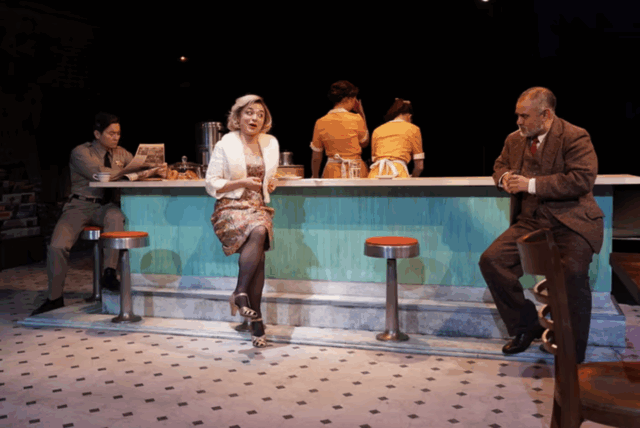
Bus Stop takes place in a comfy diner in small-town Kansas during a snowstorm (photo by Carol Rosegg)
BUS STOP
Classic Stage Company, Lynn F. Angelson Theater
136 East Thirteenth St. between Third & Fourth Aves.
Through June 8, $76-$132
www.classicstage.org
This is the last weekend to see Jack Cummings III’s ravishing adaptation of William Inge’s Bus Stop, the 1955 play that was expanded into a popular film in 1956 — famously starring Marilyn Monroe — and turned into a musical, Cherry, in 1972.
A coproduction of Classic Stage Company, the National Asian American Theatre Company (NAATCO), and Transport Group, the story takes place in a small-town Kansas diner, where a bus has been sidelined because of road closures during a March storm. Working the night shift are Elma (Delphi Borich), a high school student saving money for college, and the older Grace (Cindy Cheung), who needs a jolt of excitement in her life.
The local sheriff, Will (David Lee Huynh), prepares them for the bus’s arrival, letting them know that it will be at least several hours before the roads are cleared. Soon the bus driver, Carl (David Shih), enters, followed by Dr. Lyman (Rajesh Bose), a professor attracted to literature, alcohol, and Elma; Cherie (Midori Francis), a nightclub chanteuse; Bo (Michael Hsu Rosen), a twenty-one-year-old Montana rancher determined to marry Cherie; and his right-hand man, the loyal Virgil (Moses Villarama), who travels with his guitar.
Over the course of one evening, the men approach the women and a variety of encounters ensue: couplings motivated by convenience, lechery, and thunderstruck first love that would raise a few questions about consent today. With deft artistry, the company makes the story work without raising the hackles of every woman in the audience, which it could well do. The characters rhapsodize about love and loss, sex and grief, either looking back at where their life went wrong or gazing into a future they hope will be filled with something better.
Peiyi Wong’s diner set is realistic and charming, while Mariko Ohigashi’s costumes evoke midcentury America. As the narrative focuses on various pairs having conversations, R. Lee Kennedy’s lighting shifts on them but keeps the others in clear view. Cummings III, who previously directed Inge’s Picnic, The Dark at the Top of the Stairs, and Come Back, Little Sheba, maintains an even flow during the show’s two hours, including one pause and one intermission. The all-Asian ensemble is excellent, although it takes time for one of the key plots to heat up.
The diner might not have rye bread, cheese, or booze, but it’s still a lovely place to settle in for a few hours, especially when you need a break from what’s going on outside.
[Mark Rifkin is a Brooklyn-born, Manhattan-based writer and editor; you can follow him on Substack here.]